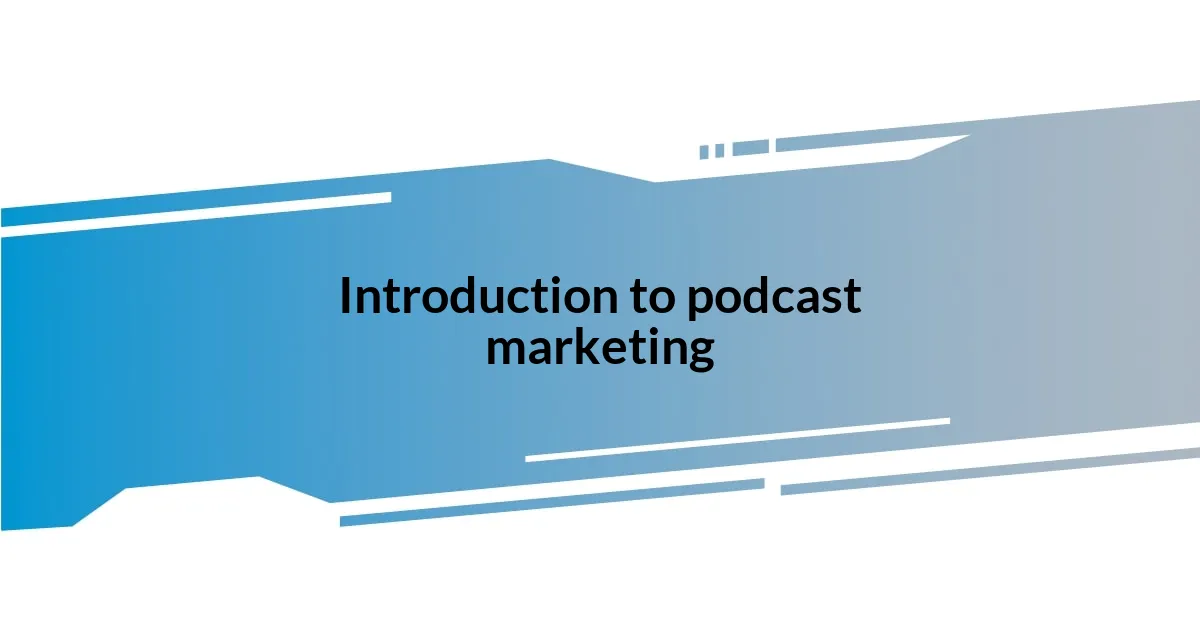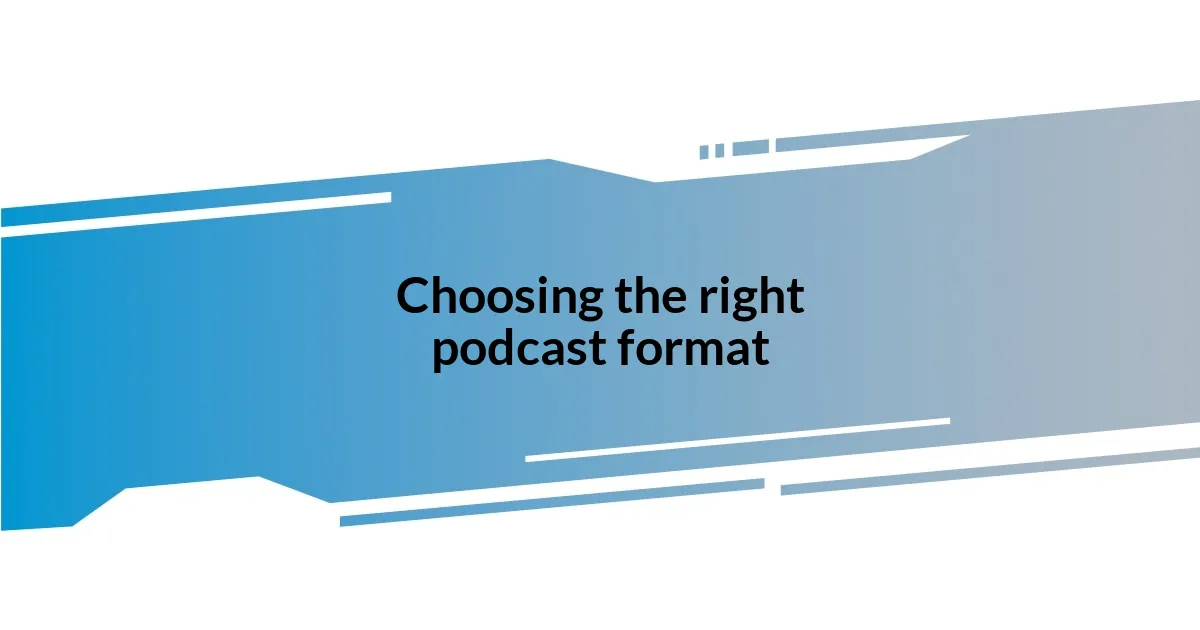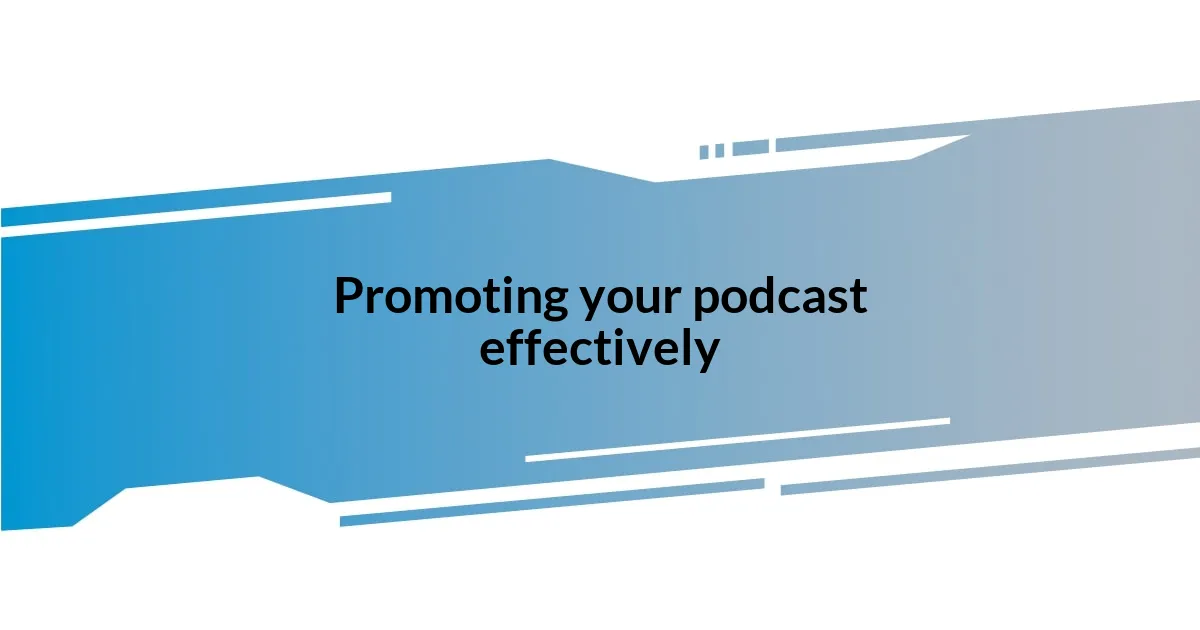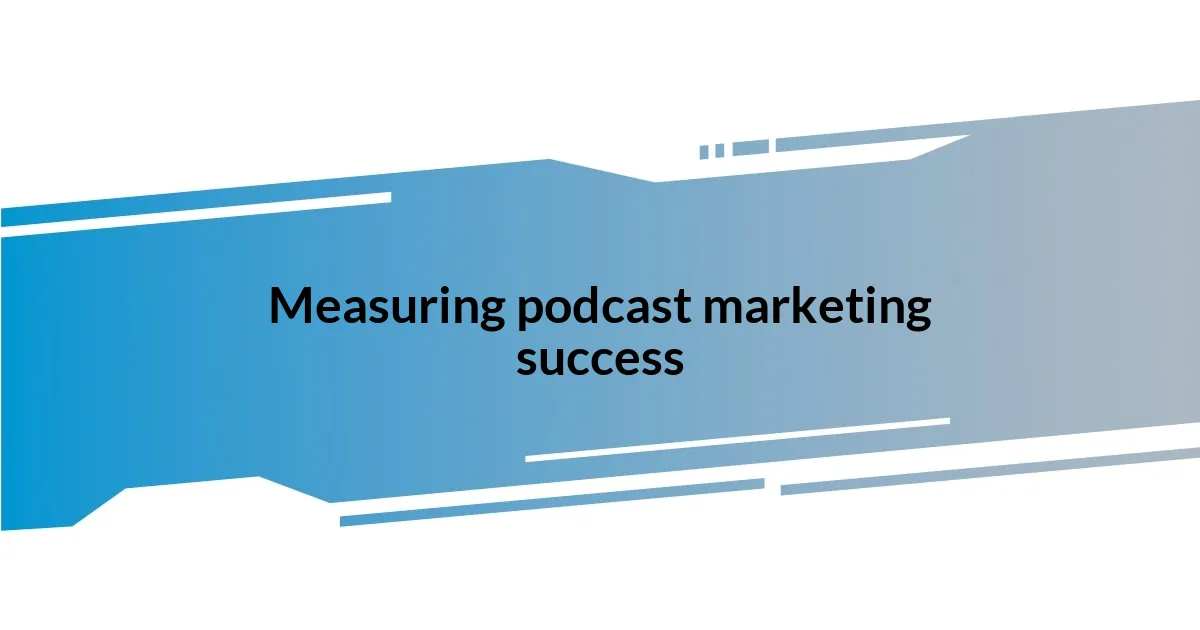Key takeaways:
- Podcast marketing fosters deeper connections through authentic storytelling and relatable content, shifting from traditional advertising.
- Selecting the right podcast format enhances listener engagement; exploring various formats can cater to audience preferences.
- Effective promotion uses multiple channels, including social media and collaborations, to build community and enhance reach.
- Measuring success involves analytics and listener feedback, highlighting the importance of connection over mere statistics.

Introduction to podcast marketing
Podcast marketing has emerged as a transformative tool for brands seeking deeper connections with their audiences. I remember the first time I tuned into a podcast that resonated with me; it wasn’t just about the content, but how the host made me feel understood and part of a community. Have you ever experienced that? It sparked my curiosity about how businesses could harness this intimate medium for their own marketing efforts.
Delving into podcast marketing feels like opening a door to a new way of storytelling. Traditional advertising often interrupts; podcasts, however, invite listeners into conversations. With floods of content available, I’ve found that finding a niche audience through podcasts can significantly fuel engagement, transforming passive listeners into passionate advocates for my brand.
As I navigated the world of podcasts, I discovered the power of authenticity. Listeners crave genuine voices and relatable stories rather than polished sales pitches. It made me rethink my approach—how can I be more real in my marketing? Engaging with audiences in this manner not only builds trust but also fosters loyalty, which is something every marketer dreams of achieving.

Choosing the right podcast format
Choosing the right podcast format is crucial for connecting with your audience effectively. From my experience, each format has unique strengths and challenges. For instance, conversational interviews can spark spontaneous insights that resonate with listeners, while scripted narratives allow for polished storytelling. I remember experimenting with a solo format at first, which felt daunting, but ultimately helped me share my thoughts authentically and establish my voice.
When I began podcasting, I quickly realized that the format I chose shaped the overall listener experience. A discussion panel can generate dynamic conversations, but it requires careful moderation to keep the focus. On the other hand, a tutorial format, where you share skills or knowledge, can position you as an authority. I once hosted a Q&A session, and the engagement was incredible! Answering listeners’ questions directly felt personal and brought a sense of community to my podcast.
Selecting the right format isn’t just about what feels comfortable—it’s about what will best serve your audience’s needs. I’ve learned that understanding their preferences can guide your choice. Are they looking for entertainment, education, or inspiration? A mix of formats could also be beneficial. The flexibility not only keeps things fresh but also allows listeners to engage in various ways.
| Podcast Format | Pros |
|---|---|
| Conversational Interviews | Dynamic and engaging; allows for organic exchange |
| Scripted Narratives | Polished storytelling; greater control over message |
| Panel Discussions | Diverse perspectives; fosters debate and engagement |
| Tutorials | Positions you as an expert; practical value for listeners |

Promoting your podcast effectively
To promote your podcast effectively, it’s essential to leverage multiple channels. I’ve found that having a solid social media strategy can amplify reach significantly. For example, I started sharing bite-sized audio clips accompanied by engaging visuals on platforms like Instagram and TikTok, and the response was incredible. Connecting with listeners where they already spend their time creates a sense of community and excitement around each episode.
Here are some strategies that can enhance your promotional efforts:
- Utilize social media platforms to share snippets and engage with your audience in real-time.
- Integrate email marketing by sending newsletters that highlight new episodes and exclusive content.
- Collaborate with other podcasters or influencers to tap into their audience base.
- Host live events or Q&A sessions, creating interactive opportunities for listeners to connect with you.
- Encourage listener feedback and actively incorporate it into your show, making them feel valued and involved.
Another strategy I’ve adopted is networking within the podcasting community. I remember reaching out to fellow podcasters for guest appearances, which not only brought new voices to my platform but also introduced my podcast to their loyal audience. Sharing promotional efforts, like cross-promoting episodes, added a sense of camaraderie and helped both parties grow. Building genuine relationships within the industry not only enriches your content but also builds a supportive network that can significantly boost your promotional initiatives.

Measuring podcast marketing success
Measuring the success of my podcast marketing strategies has been a journey filled with learning curves and personal discoveries. One tool that has become invaluable to me is analytics. Tracking downloads, listener demographics, and engagement metrics not only guides my content decisions but also reveals which episodes resonate most. For instance, I once noticed a spike in downloads following an episode with a guest who shared a particularly emotional story. It made me realize how powerful authentic storytelling can be.
Beyond straightforward numbers, I’ve found that listener feedback plays a critical role in assessing success. Each time I receive a message or a review, it gives me insight into how my audience feels about the content I provide. I remember a listener reaching out to share how an episode helped them through a tough time. Moments like these remind me that the impact of our work goes far beyond statistics; it’s about creating connections that can genuinely change lives.
I also like to set specific goals for each campaign or episode—whether that’s increasing listener retention or encouraging shares on social media. With every target, the excitement builds, but so does the urgency to create something worthwhile. Have you ever set a goal and felt that electric mix of motivation and pressure? That’s how I approach each new project, ensuring each episode not only meets my expectations but also exceeds those of my audience.

Leveraging audience engagement for growth
Engaging with your audience can transform your podcast into a thriving community. I vividly remember a moment when I decided to experiment with live Q&A sessions. The excitement in the air was palpable, and listeners eagerly awaited the chance to share their thoughts and ask questions. It was incredible to see how much they valued the opportunity to interact directly. This approach not only boosted listener engagement but also created a deeper connection between me and my audience.
I’ve learned that responding to listener feedback is equally essential. After an episode, I once received a message from a listener who had faced a significant challenge. Their appreciation for the episode and the insights they gained touched me profoundly. It made me realize how powerful it is to listen to your audience. By incorporating their suggestions into future episodes, I not only make them feel heard but also foster a sense of ownership within the community.
Moreover, I’ve played around with audience polls to gauge interest in future topics. I find that involving listeners in the decision-making process not only makes them feel valued but also ensures that my content is truly relevant. Have you ever felt more invested in something because you helped shape it? That’s the magic of audience engagement—it cultivates loyalty and creates an environment where listeners are eager to share and support your growth.